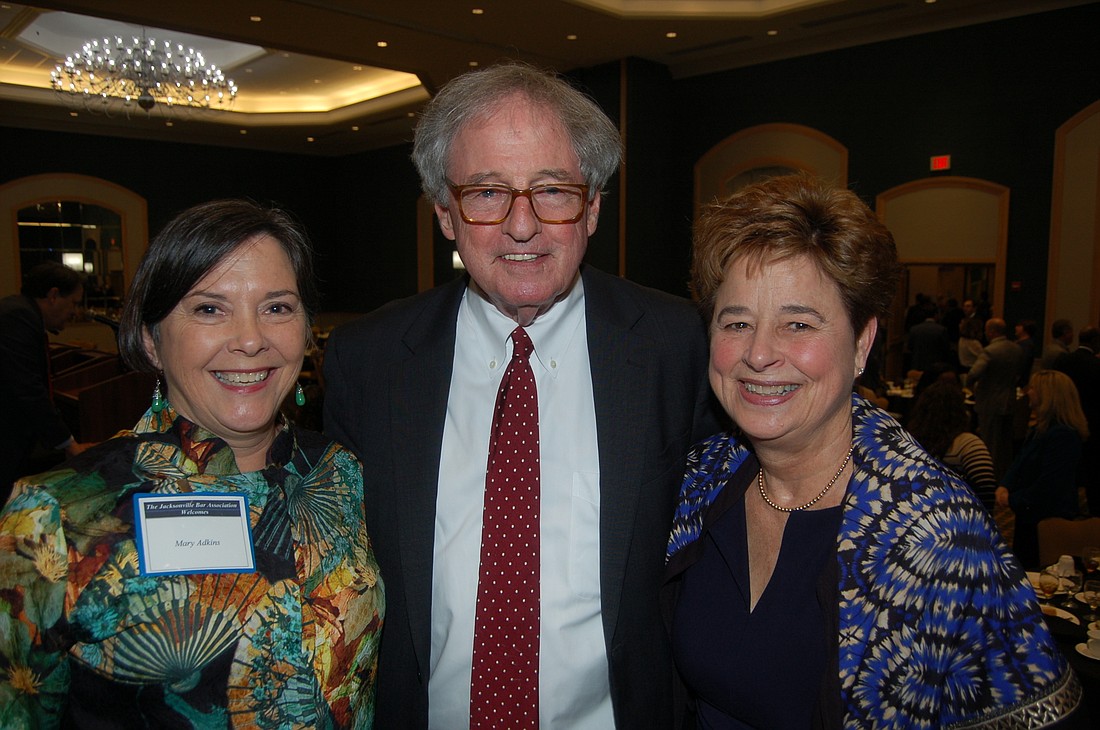
The Florida Constitution Revision Commission is entering the final phase of its yearlong deliberations, and on Wednesday, The Jacksonville Bar Association got an update on its progress and insight into how the process works.
The commission is convened every 20 years to consider possible constitutional amendments, which are placed on the general election ballot for voters to approve or reject.
Attorney Hank Coxe, a partner at The Bedell Firm and chair of the commission’s Ethics and Elections Committee, was joined at the Bar’s monthly meeting by Martha Barnett, a retired senior partner at Holland & Knight, and Mary Adkins, a law professor at the University of Florida.
Adkins is author of “Making Modern Florida: How the Spirit of Reform Shaped a New Constitution,” an in-depth study of the state’s modern constitution.
Barnett was a member of the revision commission in 1997-98 and is a past president of the American Bar Association.
Adkins said one of the provisions in the 1968 constitution was that there would be a revision process 10 years after it was adopted and then every 20 years.
Members are appointed by the governor, Senate president, speaker of the House and the chief justice of the state Supreme Court, while the attorney general is an automatic member.
Adkins said the modern constitution was written by the 1966 Constitution Advisory Commission. The 2017-18 group differs from the 1977-78 and 1997-98 commissions in that it is the first time there are no members who are serving through a second appointment.
The commission put eight proposed amendments on the 1978 ballot and all failed, Coxe said. In 1998, nine amendments were considered by voters and eight were approved with a simple majority: at least 50 percent. This year, for an amendment to become part of the constitution, it must receive at least 60 percent of the vote.
The commission has whittled down more than 900 amendments proposed by the public and commissioners beginning last spring to a “short list” of 37 that were approved by two of the commission’s committees.
They are the subject of a series public hearings across the state before the commission makes its final decisions on amendments that will be presented to the secretary of state for inclusion on the Nov. 8 ballot.
Coxe said that during the hearings, some speakers asked that proposals that didn’t make the short list be reconsidered for the ballot.
That was the case Monday, when the commission heard public comment at the University of North Florida.
Proposal 22 would guarantee a woman’s right to privacy if she chooses to have an abortion. It was struck down in the committee process, but was suggested for resurrection by the public. That would require a majority of votes by commissioners for reconsideration and then approval by at least 22 of the 37 members to put it on the ballot.
“I urge the commission to be cautious,” said Barnett, because voters might object to the proposal appearing on the ballot after it failed to make the short list.
“That could backfire and create an environment of distrust,” she said.
Another failed proposal that has been suggested by the public for reconsideration is an amendment to allow voters who aren’t registered as Democrats or Republicans to vote in primary elections.
Coxe said that despite 3.4 million people – nearly 30 percent of the electorate – currently are registered as “no party affiliation,” and unable to vote in primaries, “I don’t see that going anywhere with this commission.”
One of the more controversial proposals that made the short list would allow public money to be appropriated by the Legislature to religious organizations for nonreligious purposes, such as private schools.
Barnett said that possibility has been discussed for at least 10 years, but hasn’t gained enough traction to become law because “many people believe it will lead to public dollars going to religious institutions,” which would subvert the concept of separation of church and state defined in the U.S. Constitution.
Proposal 96, which would establish new rights for victims of crime under the constitution, also is proving to be controversial.
At the public hearing at UNF, multiple speakers represented each side of the issue, with people who have been victims of crime on one side and attorneys on the other.
The victims argue they should have the right to be informed of every procedural hearing and other legal actions regarding the case that involves them, as well as the right to choose to not participate in the defense discovery process, including refusing to be interviewed or deposed about the facts of the case.
Attorneys argue the amendment would tend to slow down the justice system and burden the courts.
That proposal, modeled after a law that went into effect in California in 1983, is unique among the 37 on the short list because it was not suggested by a commissioner or by the public. It was instead put forth by paid lobbyists, Coxe said, and it will be considered by the commission for inclusion on the ballot.
The commission has scheduled additional public hearings Monday in Pensacola, March 13 in St. Petersburg and a date to be determined in Southwest Florida.
At the conclusion of the hearings, the commission will begin to consider the proposed amendments and must submit to the secretary of state by May 10 amendments that will appear on the November ballot.
Barnett advised that the commissioners should perform their work with the understanding of the body’s independent role in shaping state law for decades into the future.
The issues it proposes to put before voters are not subject to confirmation by the Legislature or the courts.
“This is a powerful political body, but the commission serves at the pleasure of the people. It is the people’s commission,” she said.